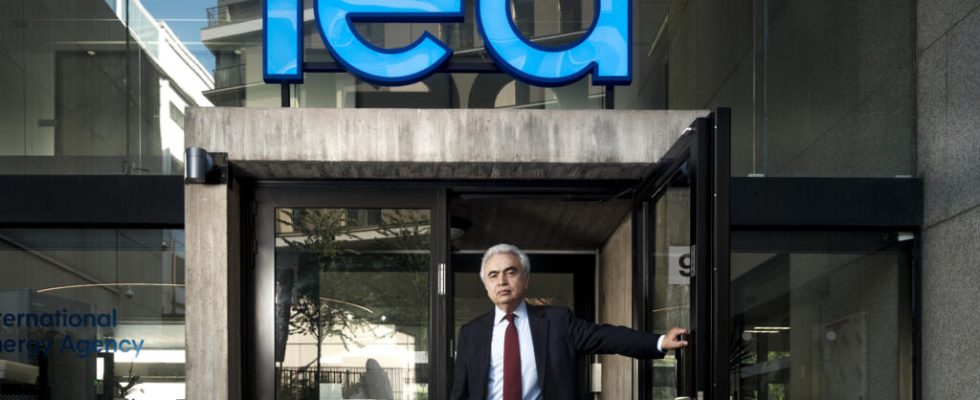Starting this Sunday, January 28, Rome is hosting an Italy-Africa summit which is due to end on Monday. A series of heads of state from the continent are expected. On the menu of the invitation from the head of the Italian government Georgia Meloni: migration issues, but also energy diplomacy. Italy is eyeing the continent’s gas deposits. The executive director of the International Energy Agency (IEA), Fatih Birol, a voice listened to on energy transition, will be present in Rome. With the aim of pushing the development of renewable energies on the continent and that gas first benefits African citizens.
5 mins
RFI: What messages will you bring during this Italy-Africa summit in Rome ?
Fatih Birol: Throughout the world, in Asia, in Latin America, electricity consumption per person is increasing significantly. But in Africa, it has not changed for thirty years. This shows us that to develop economically, Africa will need a lot of energy. This is one of the topics I will discuss with African heads of state.
Africa has enormous potential in terms of solar energy, but photovoltaic installations are still not very present on the continent…
The African continent concentrates 60% of global radiation. However, in sub-Saharan Africa, the quantity of electricity produced thanks to solar installations represents half of what Belgium produces in solar. It’s depressing. Imagine the map, think about how big Sub-Saharan Africa is compared to Belgium, and how much sun there is in Sub-Saharan Africa compared to Belgium. This is a total injustice! For me, the future of electricity production in Africa is renewable energies: solar above all, but also wind power, hydroelectric plants, etc. That said, Africa also has other energy needs. For example, to desalinate sea water and have access to water, for food processing, for petrochemicals or even industries, I think the continent will need to use its gas in a sustainable way.
Is this not contradictory with the common objectives of combating climate change? Gas is a fossil energy which contributes to global warming and therefore to extreme events which hit the continent such as floods and droughts…
Today, Africa emits 3% of global greenhouse gas emissions and we have done the calculation: if the continent developed all its natural gas resources in ten years, which is impossible, the African share of emissions causing global warming would increase to 3.4%. It’s nothing.
You are talking about national use of gas, but the current or planned projects are geared towards export…
I think that this should above all benefit African countries. I’m less interested in whether this benefits European countries or their companies, because Africa really needs a lot of energy. I speak with many European countries who would like to produce green hydrogen in Africa to export it to Europe. Some are even thinking of producing electricity in Africa to send it to Europe. It’s not really to my taste. I think that today Africa needs energy more than Europe. So let’s first respond to Africa’s needs and then we’ll see what happens next.
History has shown us that the resources extracted on the continent are, most of the time, exported and many African countries intend to earn foreign currency from the extraction of this gas…
I think African nations need to prioritize their domestic needs and then think about exporting. This is what I will say to the leaders of the continent during this Italy-Africa summit: “ Think first about Africa, about Africans, and then about the needs of Europeans or Chinese. »
Does the race for African gas not risk delaying the development of renewable energies on the continent?
No, renewable energy must be the priority. The reason is simple: Africa has enormous potential in renewables. Second, it’s cheaper. Cheaper than coal, cheaper than gas, cheaper than nuclear. And it’s easy. In one or two years you can build a solar installation. So, for me, the absolute priority is renewables: first solar, then hydroelectric energy and finally wind power.
Are African leaders really on the same line as you?
Many are. Kenyan President William Ruto is. We published an article together recently to highlight that this must be the top priority for Africa.
You consider that African countries should not be singled out because they exploit their gas. What about oil? Projects to explore and exploit new deposits are flourishing in Africa despite the harmful effects on the climate and despite criticism from environmental defenders…
We must reduce oil production and consumption if we are serious about achieving our goal of limiting global warming to 1.5°. But that does not mean that tomorrow we will no longer use oil at all. This means that it will go down. Companies and countries investing today need to ask themselves: If demand for oil is going to decline, are they making the right decision? Will the investments really be profitable? The International Energy Agency (IEA) estimates that oil demand will peak before 2030, and decline thereafter. In this world of declining fossil fuels, if there are many new oil projects in Africa, the Middle East and elsewhere, the returns on investment could be negative. Governments must therefore think long term, not just tomorrow.
